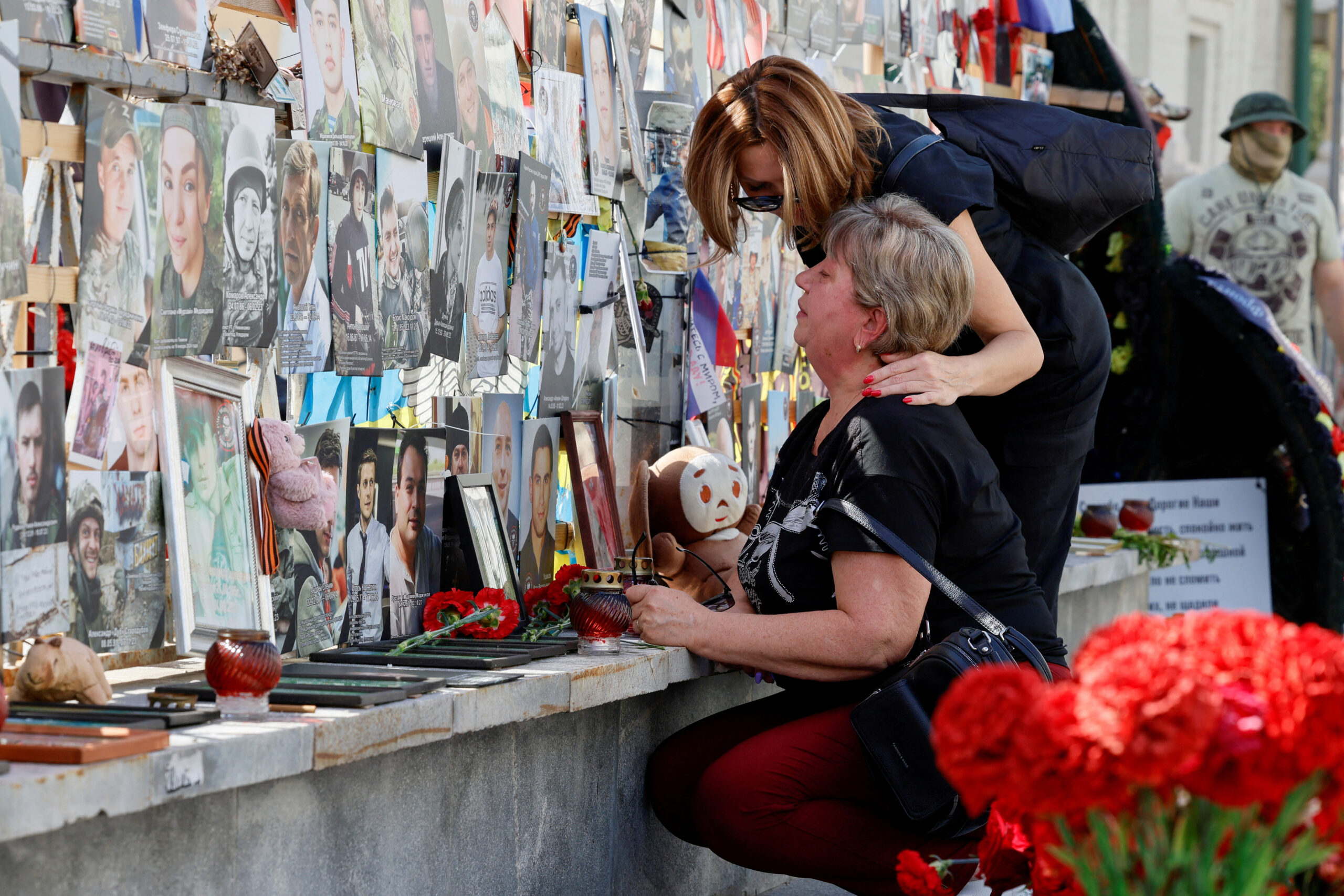
Exclusive: The identities of Wagner mercenaries who were lost in a Mali ambush have been disclosed
According to interviews with relatives and a review of social media data, Russian war veterans who survived tours in Ukraine, Libya, and Syria were among the dozens of Wagner mercenaries presumed deceased after a lethal battle with Tuareg rebels during a desert sandstorm in Mali in July.
The dangers that Russian mercenary forces, who are employed by military juntas in the arid Sahel region of Mali, Burkina Faso, and Niger, are encountering as a result of the loss of such experienced fighters, are exposed. These juntas are currently grappling with the containment of separatists and potent offshoots of Islamic State and Al Qaeda.
The Mali defeat has raised concerns about whether Moscow, which has acknowledged funding Wagner and has incorporated a significant number of its fighters into a defense ministry force, will be able to outperform the Western and U.N. troops that were recently expelled by the juntas, according to six officials and experts in the region.
The news agency was able to identify 23 fighters missing in action and two others taken into Tuareg captivity after the ambush near Tinzaouaten, a town on the Algerian border, by cross-referencing public information with online posts from relatives and fighters, consulting with seven relatives, and utilizing facial recognition software to analyze battlefield footage verified by Reuters.
Yevgeny Prigozhin, Wagner’s late founder, referred to the siege of Bakhmut in Ukraine as a “meat grinder.” Several of the soldiers had survived. Others had served in Syria, Libya, and other locations. Some were former Russian servicemen, at least one of whom had retired after a full-length military career.
Grisly footage of deceased fighters has been circulating online, and some of the relatives have informed Reuters that the corpses of their husbands and sons were abandoned in the desert. Reuters was unable to verify the number of deceased males among the individuals it identified.
Margarita Goncharova stated that her son, Vadim Evsiukov, 31, was initially recruited while serving a drug-related sentence in prison in 2022. She stated that he advanced through the ranks in Ukraine to assume command of a platoon of 500 men. She stated that he worked as a tailor upon his return home, but he was plagued by survivor’s guilt and covertly traveled to Africa in April to reunite with his former commander.
“He expressed his desire to travel to Africa on numerous occasions.” In an interview with Reuters, Goncharova stated, “I discouraged him to the best of my ability.” “I informed him that fate has granted you an opportunity that is one in a million.” You have the opportunity to begin anew; you have won an extraordinary lottery.
Wagner, the Russian Ministry of Foreign Affairs, and the Russian Ministry of Defence did not respond to inquiries for comment regarding this story.
Wagner employees were invited to participate in the Africa Corps, a newly established organization under the defense ministry, following the passing of Prigozhin in August of last year. The Africa Corps channel on the social media platform Telegram stated that its purpose was to “fight for justice and the interests of Russia.”
According to the channel, approximately half of Africa Corps’ personnel are former Wagner employees who are permitted to utilize Wagner insignia. Wagner’s social media platforms continue to function.
The Tinzaouaten battle has not been the subject of public commentary from the Russian government.
The government of Mali, which is headed by the armed forces, stated that the defeat did not affect its objectives. Colonel Major Souleymane Dembele, the army’s spokesperson, informed Reuters that the Malian Armed Forces are dedicated to the restoration of the state’s authority throughout the nation.
Wagner has acknowledged substantial losses in the Mali ambush, but he has not provided a specific figure. Additionally, the Malian army, which engaged in combat alongside the Russians, did not incur any casualties. The Tuareg militants, who are advocating for an independent homeland, claimed that they had murdered 84 Russians and 47 Malians.
Reuters was unable to independently determine the number of dead in the combat. A Tuareg rebel spokesman sent Reuters over 20 videos, one of which depicted at least 47 bodies in military-style uniforms, primarily white males, lying in the desert. The video’s date and location were confirmed by Reuters.
Mikhail Zvinchuk, a prominent blogger who is closely associated with the Russian defense ministry, stated on the social media platform RuTube in August that the defeat demonstrated that Wagner fighters who had arrived from Ukraine had underestimated the separatists and the Al Qaeda fighters.
NOT PRESENT
Nikita Fedyakin, the administrator of The Grey Zone, a popular Wagner-focused Telegram channel with over half a million subscribers, and Sergei Shevchenko, who the accounts characterized as the unit commander, were identified as two of the deceased by Wagner-linked Telegram accounts. Shevchenko’s identity was not verified by Reuters.
Reuters independently identified 23 Wagner operators who are missing in Mali by examining the identities of the missing individuals in an official Wagner Telegram chat group, as well as publicly available data, social media accounts, and facial recognition software contributed by relatives. The chat group reported that Wagner recruiters contacted all of the relatives on August 6 to inform them that their men were AWOL in action.
Lyubov Bazhenova disclosed to Reuters that she was unaware that her son, Vladimir Akimov, 25, had enrolled in the elite airborne forces of Russia, where he had previously served as a conscript. She was enraged with Wagner for failing to disclose any additional information regarding his fate or the location of his body. She stated that the prosecutor’s office, defense ministry, and foreign ministry had not responded to her correspondence.
Based on photographs and videos of the ambush site that were published by Tuareg sources, facial-recognition software was employed to identify two additional individuals who were captured by Tuareg fighters. The Tuareg rebels shared videos and photographs of the two captives on social media. The men were in insurgent captivity as of late August, according to Mohamed Elmaouloud Ramadane, a spokesman for the rebel alliance.
Lyudmila Kuzekmaeva, the widow of one of the missing fighters, Alexei Kuzekmaev, 47, disclosed to Reuters that he possessed no military experience.
“Neither my tears, my hysteria, nor my persuasion were effective.” A month prior to his departure, he confronted me. He stated, “I have purchased a ticket and will be departing.”
Alexander Lazarev, 48, a Russian army veteran who participated in conflicts against Chechen separatists in the 1990s and 2000s, was among the most experienced individuals, as indicated by his wife’s postings on the Wagner channel.
She declined to provide an opinion. Lazarev is depicted in numerous photographs on the Russian Facebook equivalent, VKontakte, donning military uniforms that bear insignia associated with numerous army subdivisions.
PARASTATAL MERCENARY FORCE
A series of coups has resulted in the overthrow of democratic governments in Mali, Burkina Faso, and Niger since 2020. These coups were motivated by a combination of Western failures to combat insurgencies that have resulted in the displacement of millions and the death of thousands of individuals, as well as rage toward corrupt leaders.
French and U.S. personnel, as well as U.N. peacekeepers, have been expelled by the military juntas.
Wagner emerged in Sudan in 2017 as the deniable visage of Russian operations in Africa. Its activities soon expanded to include the protection of African coup leaders, gold extraction, and the suppression of jihadists. Wagner is also engaged in the Central African Republic. In late 2021, it made its initial appearance in Mali.
Last year, Wagner’s fortunes fluctuated. The group’s capture of Bakhmut in May marked Russia’s first significant battlefield victory in Ukraine in nearly a year. However, Prigozhin perished in a fiery plane accident in August after his criticism of Russian military leaders and his attempt to lead a rebellion weeks after the Bakhmut victory. U.S. officials’ assertion that Putin ordered the assassination of Prigozhin has been declared a “absolute lie” by the Kremlin.
In the post-Prigozhin era, the Putin administration has acquired complete control over the Wagner brand, according to Eric Whitaker, the top U.S. envoy to Burkina Faso until his retirement in June. Whitaker previously served in Niger, Mali, and Chad.
“Africa Corps earns (the Russian government) hard-currency payments from host governments for its services and also gains a significant source of revenue from gold derived from its activities in the Sahel,” according to him.
A U.S.-based crisis-monitoring group, the Armed Conflict Location & Event Data Project (ACLED), has reported that Russian mercenary activity in Mali increased significantly following the establishment of Africa Corps. The data indicates that violent events associated with Russian mercenaries increased by 81% and reported civilian fatalities increased by 65% in the past year, as compared to the year prior to Prigozhin’s demise, as indicated by media reports and social media documentation.
Recruitment statistics are not disclosed by Wagner. Jędrzej Czerep, an analyst at the Polish Institute of International Affairs, a think tank based in Warsaw, estimated that approximately 6,000 Russian mercenaries are currently serving in Africa. Three diplomatic sources reported that approximately 1,500-2,000 Russian mercenaries are in Mali.
“When Africa Corps started to promote and recruit, they were flooded with applications,” reported Czerep.
“Being sent to one of the African missions was seen as far safer than Ukraine,” according to him.
Ramadane, the spokesperson for the Tuareg people, stated that the insurgent alliance was preparing for additional conflicts.
In 2019, Tibor Nagy, the senior U.S. envoy to Africa, warned that additional losses could ultimately result in Russia’s departure from northern Mozambique. Wagner withdrew from the region months after approximately twelve of its personnel were slain in a conflict with an Islamic State affiliate.
Nagy stated, “They evacuated the area in a matter of seconds.”
Wagner has refrained from providing any public commentary regarding its intentions in Mali.
All Categories
Recent Posts
Salah has the potential to repeat Premier League history
Mokwana creates history in Tunisia
Tags
+13162306000
zoneyetu@yahoo.com



